CHCMHS011 Healthcare Assignment: Ethical Practice and Mental Health
VerifiedAdded on 2020/12/07
|11
|4013
|599
Homework Assignment
AI Summary
This document provides comprehensive notes on the CHCMHS011 module, focusing on ethical practice, professional boundaries, and mental health treatment. It addresses key aspects such as codes of ethics, job descriptions, and professional behavior, emphasizing the importance of trust and respect in the community. The assignment details strategies to improve physical health, including setting realistic goals. It also covers professional boundaries, emphasizing the separation between professional conduct and personal views, and provides guidance on maintaining appropriate relationships. The document discusses workplace safety responsibilities and the rights of individuals, including the right to privacy and confidentiality. Furthermore, it explores sexuality principles, offering strategies for sexual and sensual expression, intimacy, and staff training. The notes also examine medical treatment for mental illness, including various classes of mental disorders and available treatment options. This assignment aims to provide a thorough understanding of the ethical and practical considerations in mental healthcare.
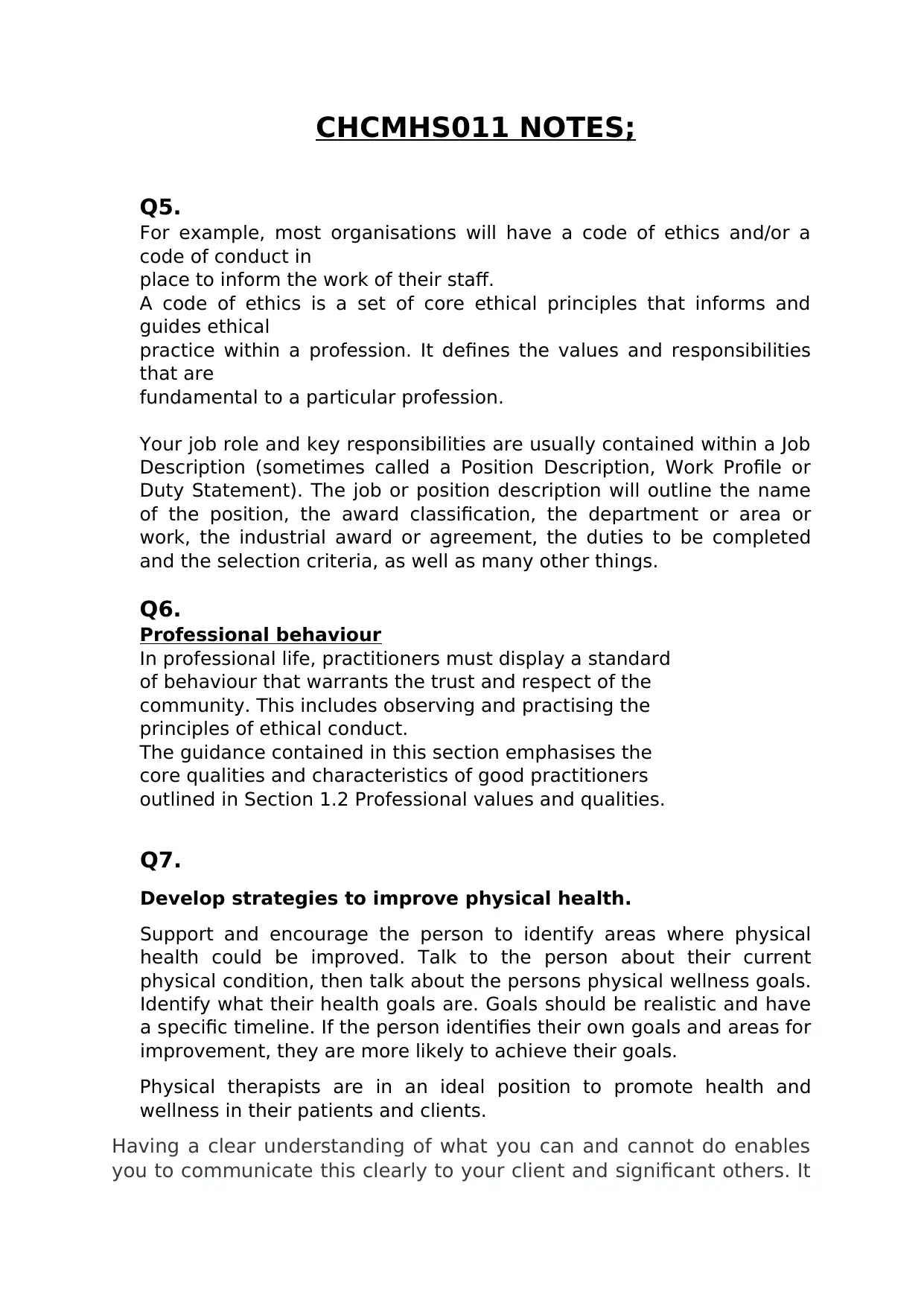
CHCMHS011 NOTES;
Q5.
For example, most organisations will have a code of ethics and/or a
code of conduct in
place to inform the work of their staff.
A code of ethics is a set of core ethical principles that informs and
guides ethical
practice within a profession. It defines the values and responsibilities
that are
fundamental to a particular profession.
Your job role and key responsibilities are usually contained within a Job
Description (sometimes called a Position Description, Work Profile or
Duty Statement). The job or position description will outline the name
of the position, the award classification, the department or area or
work, the industrial award or agreement, the duties to be completed
and the selection criteria, as well as many other things.
Q6.
Professional behaviour
In professional life, practitioners must display a standard
of behaviour that warrants the trust and respect of the
community. This includes observing and practising the
principles of ethical conduct.
The guidance contained in this section emphasises the
core qualities and characteristics of good practitioners
outlined in Section 1.2 Professional values and qualities.
Q7.
Develop strategies to improve physical health.
Support and encourage the person to identify areas where physical
health could be improved. Talk to the person about their current
physical condition, then talk about the persons physical wellness goals.
Identify what their health goals are. Goals should be realistic and have
a specific timeline. If the person identifies their own goals and areas for
improvement, they are more likely to achieve their goals.
Physical therapists are in an ideal position to promote health and
wellness in their patients and clients.
Having a clear understanding of what you can and cannot do enables
you to communicate this clearly to your client and significant others. It
Q5.
For example, most organisations will have a code of ethics and/or a
code of conduct in
place to inform the work of their staff.
A code of ethics is a set of core ethical principles that informs and
guides ethical
practice within a profession. It defines the values and responsibilities
that are
fundamental to a particular profession.
Your job role and key responsibilities are usually contained within a Job
Description (sometimes called a Position Description, Work Profile or
Duty Statement). The job or position description will outline the name
of the position, the award classification, the department or area or
work, the industrial award or agreement, the duties to be completed
and the selection criteria, as well as many other things.
Q6.
Professional behaviour
In professional life, practitioners must display a standard
of behaviour that warrants the trust and respect of the
community. This includes observing and practising the
principles of ethical conduct.
The guidance contained in this section emphasises the
core qualities and characteristics of good practitioners
outlined in Section 1.2 Professional values and qualities.
Q7.
Develop strategies to improve physical health.
Support and encourage the person to identify areas where physical
health could be improved. Talk to the person about their current
physical condition, then talk about the persons physical wellness goals.
Identify what their health goals are. Goals should be realistic and have
a specific timeline. If the person identifies their own goals and areas for
improvement, they are more likely to achieve their goals.
Physical therapists are in an ideal position to promote health and
wellness in their patients and clients.
Having a clear understanding of what you can and cannot do enables
you to communicate this clearly to your client and significant others. It
Paraphrase This Document
Need a fresh take? Get an instant paraphrase of this document with our AI Paraphraser
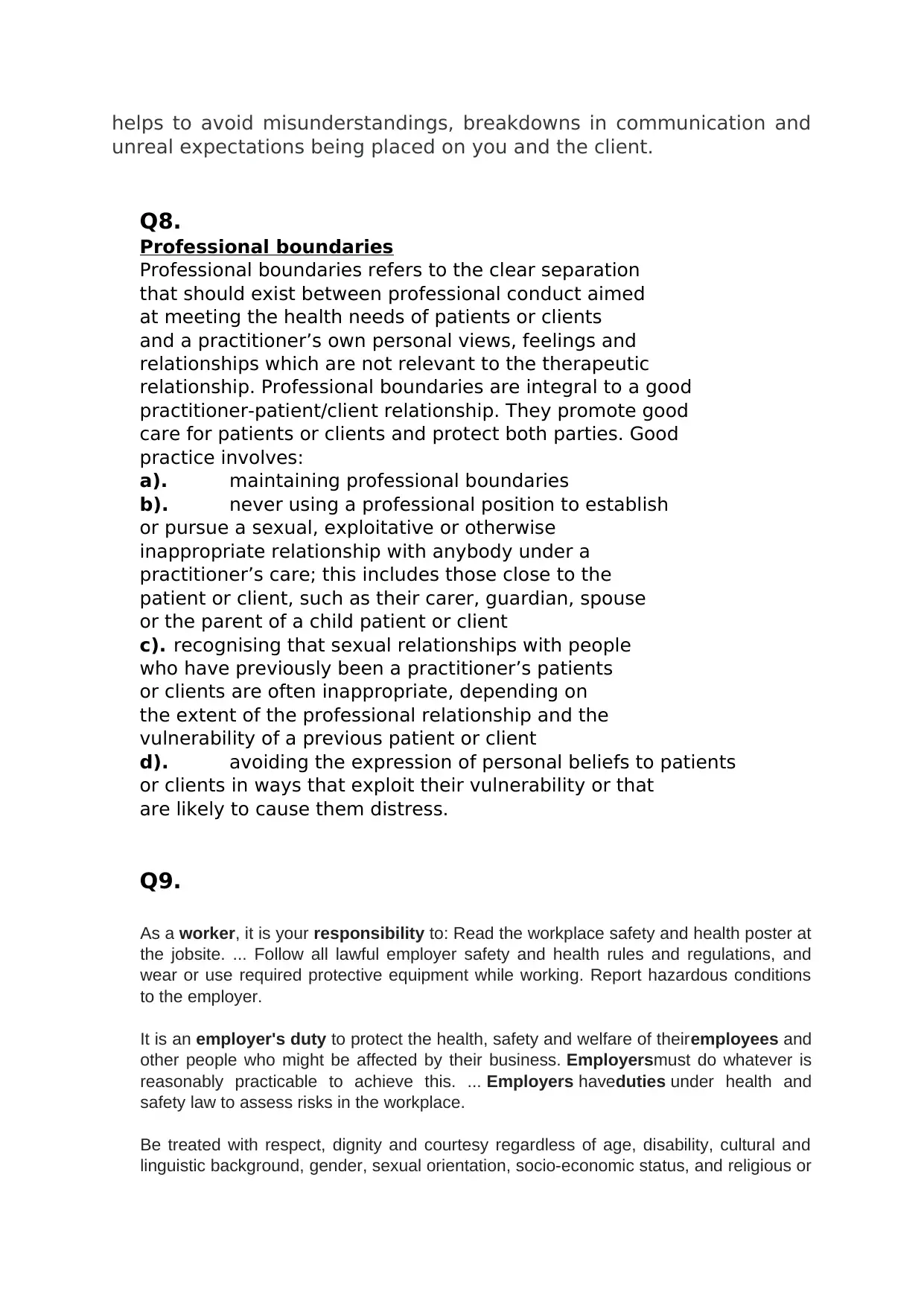
helps to avoid misunderstandings, breakdowns in communication and
unreal expectations being placed on you and the client.
Q8.
Professional boundaries
Professional boundaries refers to the clear separation
that should exist between professional conduct aimed
at meeting the health needs of patients or clients
and a practitioner’s own personal views, feelings and
relationships which are not relevant to the therapeutic
relationship. Professional boundaries are integral to a good
practitioner-patient/client relationship. They promote good
care for patients or clients and protect both parties. Good
practice involves:
a). maintaining professional boundaries
b). never using a professional position to establish
or pursue a sexual, exploitative or otherwise
inappropriate relationship with anybody under a
practitioner’s care; this includes those close to the
patient or client, such as their carer, guardian, spouse
or the parent of a child patient or client
c). recognising that sexual relationships with people
who have previously been a practitioner’s patients
or clients are often inappropriate, depending on
the extent of the professional relationship and the
vulnerability of a previous patient or client
d). avoiding the expression of personal beliefs to patients
or clients in ways that exploit their vulnerability or that
are likely to cause them distress.
Q9.
As a worker, it is your responsibility to: Read the workplace safety and health poster at
the jobsite. ... Follow all lawful employer safety and health rules and regulations, and
wear or use required protective equipment while working. Report hazardous conditions
to the employer.
It is an employer's duty to protect the health, safety and welfare of theiremployees and
other people who might be affected by their business. Employersmust do whatever is
reasonably practicable to achieve this. ... Employers haveduties under health and
safety law to assess risks in the workplace.
Be treated with respect, dignity and courtesy regardless of age, disability, cultural and
linguistic background, gender, sexual orientation, socio-economic status, and religious or
unreal expectations being placed on you and the client.
Q8.
Professional boundaries
Professional boundaries refers to the clear separation
that should exist between professional conduct aimed
at meeting the health needs of patients or clients
and a practitioner’s own personal views, feelings and
relationships which are not relevant to the therapeutic
relationship. Professional boundaries are integral to a good
practitioner-patient/client relationship. They promote good
care for patients or clients and protect both parties. Good
practice involves:
a). maintaining professional boundaries
b). never using a professional position to establish
or pursue a sexual, exploitative or otherwise
inappropriate relationship with anybody under a
practitioner’s care; this includes those close to the
patient or client, such as their carer, guardian, spouse
or the parent of a child patient or client
c). recognising that sexual relationships with people
who have previously been a practitioner’s patients
or clients are often inappropriate, depending on
the extent of the professional relationship and the
vulnerability of a previous patient or client
d). avoiding the expression of personal beliefs to patients
or clients in ways that exploit their vulnerability or that
are likely to cause them distress.
Q9.
As a worker, it is your responsibility to: Read the workplace safety and health poster at
the jobsite. ... Follow all lawful employer safety and health rules and regulations, and
wear or use required protective equipment while working. Report hazardous conditions
to the employer.
It is an employer's duty to protect the health, safety and welfare of theiremployees and
other people who might be affected by their business. Employersmust do whatever is
reasonably practicable to achieve this. ... Employers haveduties under health and
safety law to assess risks in the workplace.
Be treated with respect, dignity and courtesy regardless of age, disability, cultural and
linguistic background, gender, sexual orientation, socio-economic status, and religious or
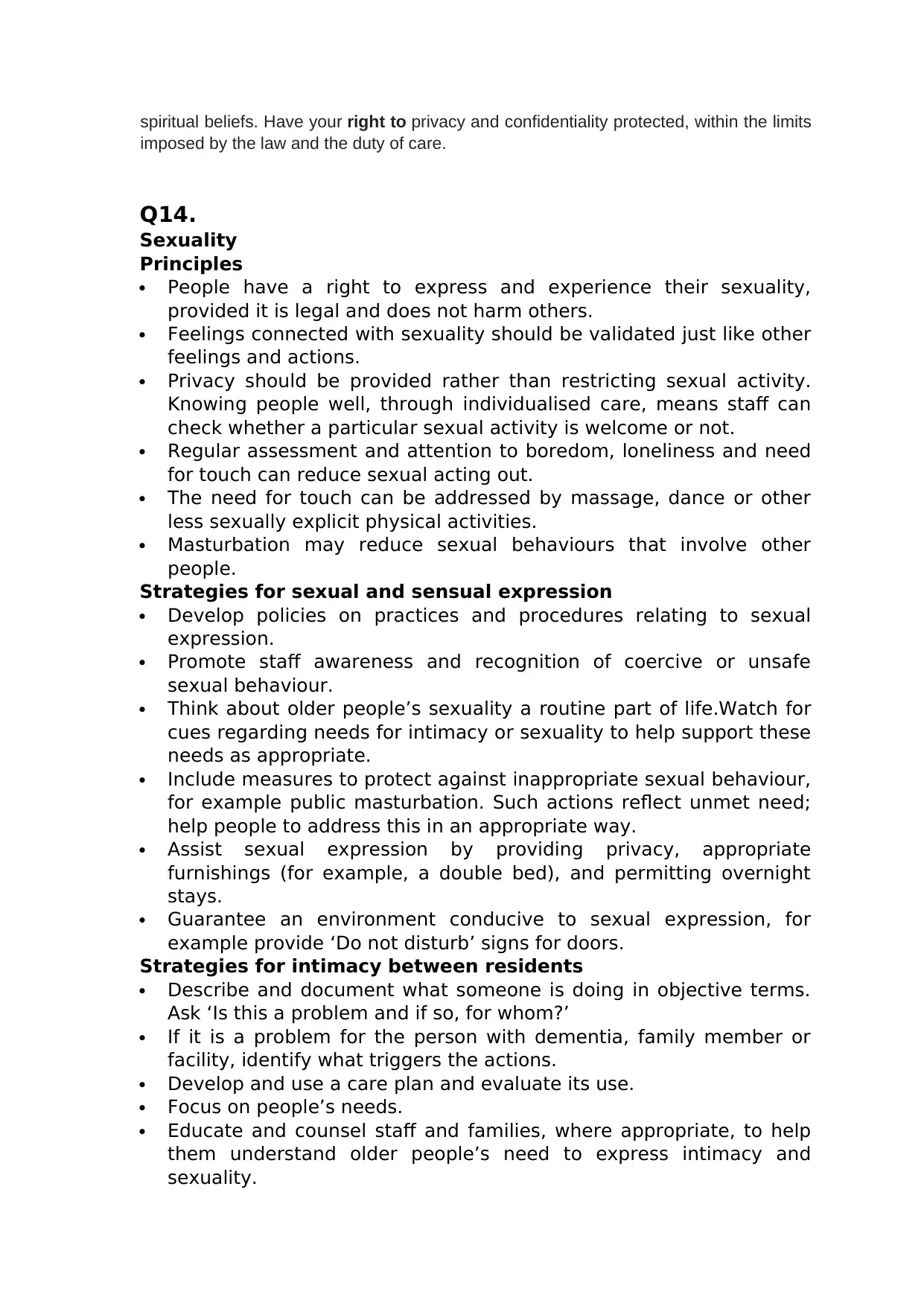
spiritual beliefs. Have your right to privacy and confidentiality protected, within the limits
imposed by the law and the duty of care.
Q14.
Sexuality
Principles
People have a right to express and experience their sexuality,
provided it is legal and does not harm others.
Feelings connected with sexuality should be validated just like other
feelings and actions.
Privacy should be provided rather than restricting sexual activity.
Knowing people well, through individualised care, means staff can
check whether a particular sexual activity is welcome or not.
Regular assessment and attention to boredom, loneliness and need
for touch can reduce sexual acting out.
The need for touch can be addressed by massage, dance or other
less sexually explicit physical activities.
Masturbation may reduce sexual behaviours that involve other
people.
Strategies for sexual and sensual expression
Develop policies on practices and procedures relating to sexual
expression.
Promote staff awareness and recognition of coercive or unsafe
sexual behaviour.
Think about older people’s sexuality a routine part of life.Watch for
cues regarding needs for intimacy or sexuality to help support these
needs as appropriate.
Include measures to protect against inappropriate sexual behaviour,
for example public masturbation. Such actions reflect unmet need;
help people to address this in an appropriate way.
Assist sexual expression by providing privacy, appropriate
furnishings (for example, a double bed), and permitting overnight
stays.
Guarantee an environment conducive to sexual expression, for
example provide ‘Do not disturb’ signs for doors.
Strategies for intimacy between residents
Describe and document what someone is doing in objective terms.
Ask ‘Is this a problem and if so, for whom?’
If it is a problem for the person with dementia, family member or
facility, identify what triggers the actions.
Develop and use a care plan and evaluate its use.
Focus on people’s needs.
Educate and counsel staff and families, where appropriate, to help
them understand older people’s need to express intimacy and
sexuality.
imposed by the law and the duty of care.
Q14.
Sexuality
Principles
People have a right to express and experience their sexuality,
provided it is legal and does not harm others.
Feelings connected with sexuality should be validated just like other
feelings and actions.
Privacy should be provided rather than restricting sexual activity.
Knowing people well, through individualised care, means staff can
check whether a particular sexual activity is welcome or not.
Regular assessment and attention to boredom, loneliness and need
for touch can reduce sexual acting out.
The need for touch can be addressed by massage, dance or other
less sexually explicit physical activities.
Masturbation may reduce sexual behaviours that involve other
people.
Strategies for sexual and sensual expression
Develop policies on practices and procedures relating to sexual
expression.
Promote staff awareness and recognition of coercive or unsafe
sexual behaviour.
Think about older people’s sexuality a routine part of life.Watch for
cues regarding needs for intimacy or sexuality to help support these
needs as appropriate.
Include measures to protect against inappropriate sexual behaviour,
for example public masturbation. Such actions reflect unmet need;
help people to address this in an appropriate way.
Assist sexual expression by providing privacy, appropriate
furnishings (for example, a double bed), and permitting overnight
stays.
Guarantee an environment conducive to sexual expression, for
example provide ‘Do not disturb’ signs for doors.
Strategies for intimacy between residents
Describe and document what someone is doing in objective terms.
Ask ‘Is this a problem and if so, for whom?’
If it is a problem for the person with dementia, family member or
facility, identify what triggers the actions.
Develop and use a care plan and evaluate its use.
Focus on people’s needs.
Educate and counsel staff and families, where appropriate, to help
them understand older people’s need to express intimacy and
sexuality.
⊘ This is a preview!⊘
Do you want full access?
Subscribe today to unlock all pages.

Trusted by 1+ million students worldwide
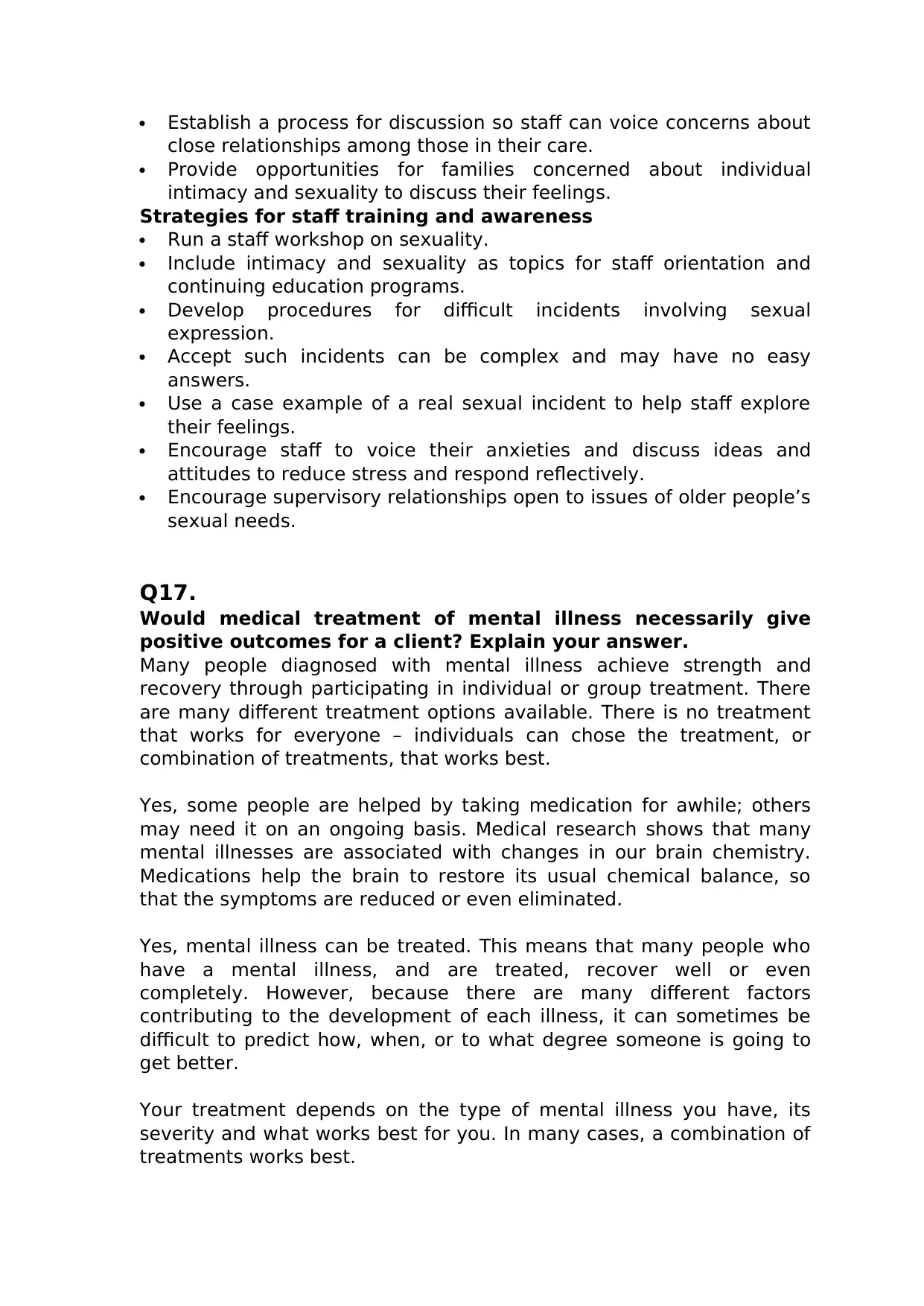
Establish a process for discussion so staff can voice concerns about
close relationships among those in their care.
Provide opportunities for families concerned about individual
intimacy and sexuality to discuss their feelings.
Strategies for staff training and awareness
Run a staff workshop on sexuality.
Include intimacy and sexuality as topics for staff orientation and
continuing education programs.
Develop procedures for difficult incidents involving sexual
expression.
Accept such incidents can be complex and may have no easy
answers.
Use a case example of a real sexual incident to help staff explore
their feelings.
Encourage staff to voice their anxieties and discuss ideas and
attitudes to reduce stress and respond reflectively.
Encourage supervisory relationships open to issues of older people’s
sexual needs.
Q17.
Would medical treatment of mental illness necessarily give
positive outcomes for a client? Explain your answer.
Many people diagnosed with mental illness achieve strength and
recovery through participating in individual or group treatment. There
are many different treatment options available. There is no treatment
that works for everyone – individuals can chose the treatment, or
combination of treatments, that works best.
Yes, some people are helped by taking medication for awhile; others
may need it on an ongoing basis. Medical research shows that many
mental illnesses are associated with changes in our brain chemistry.
Medications help the brain to restore its usual chemical balance, so
that the symptoms are reduced or even eliminated.
Yes, mental illness can be treated. This means that many people who
have a mental illness, and are treated, recover well or even
completely. However, because there are many different factors
contributing to the development of each illness, it can sometimes be
difficult to predict how, when, or to what degree someone is going to
get better.
Your treatment depends on the type of mental illness you have, its
severity and what works best for you. In many cases, a combination of
treatments works best.
close relationships among those in their care.
Provide opportunities for families concerned about individual
intimacy and sexuality to discuss their feelings.
Strategies for staff training and awareness
Run a staff workshop on sexuality.
Include intimacy and sexuality as topics for staff orientation and
continuing education programs.
Develop procedures for difficult incidents involving sexual
expression.
Accept such incidents can be complex and may have no easy
answers.
Use a case example of a real sexual incident to help staff explore
their feelings.
Encourage staff to voice their anxieties and discuss ideas and
attitudes to reduce stress and respond reflectively.
Encourage supervisory relationships open to issues of older people’s
sexual needs.
Q17.
Would medical treatment of mental illness necessarily give
positive outcomes for a client? Explain your answer.
Many people diagnosed with mental illness achieve strength and
recovery through participating in individual or group treatment. There
are many different treatment options available. There is no treatment
that works for everyone – individuals can chose the treatment, or
combination of treatments, that works best.
Yes, some people are helped by taking medication for awhile; others
may need it on an ongoing basis. Medical research shows that many
mental illnesses are associated with changes in our brain chemistry.
Medications help the brain to restore its usual chemical balance, so
that the symptoms are reduced or even eliminated.
Yes, mental illness can be treated. This means that many people who
have a mental illness, and are treated, recover well or even
completely. However, because there are many different factors
contributing to the development of each illness, it can sometimes be
difficult to predict how, when, or to what degree someone is going to
get better.
Your treatment depends on the type of mental illness you have, its
severity and what works best for you. In many cases, a combination of
treatments works best.
Paraphrase This Document
Need a fresh take? Get an instant paraphrase of this document with our AI Paraphraser
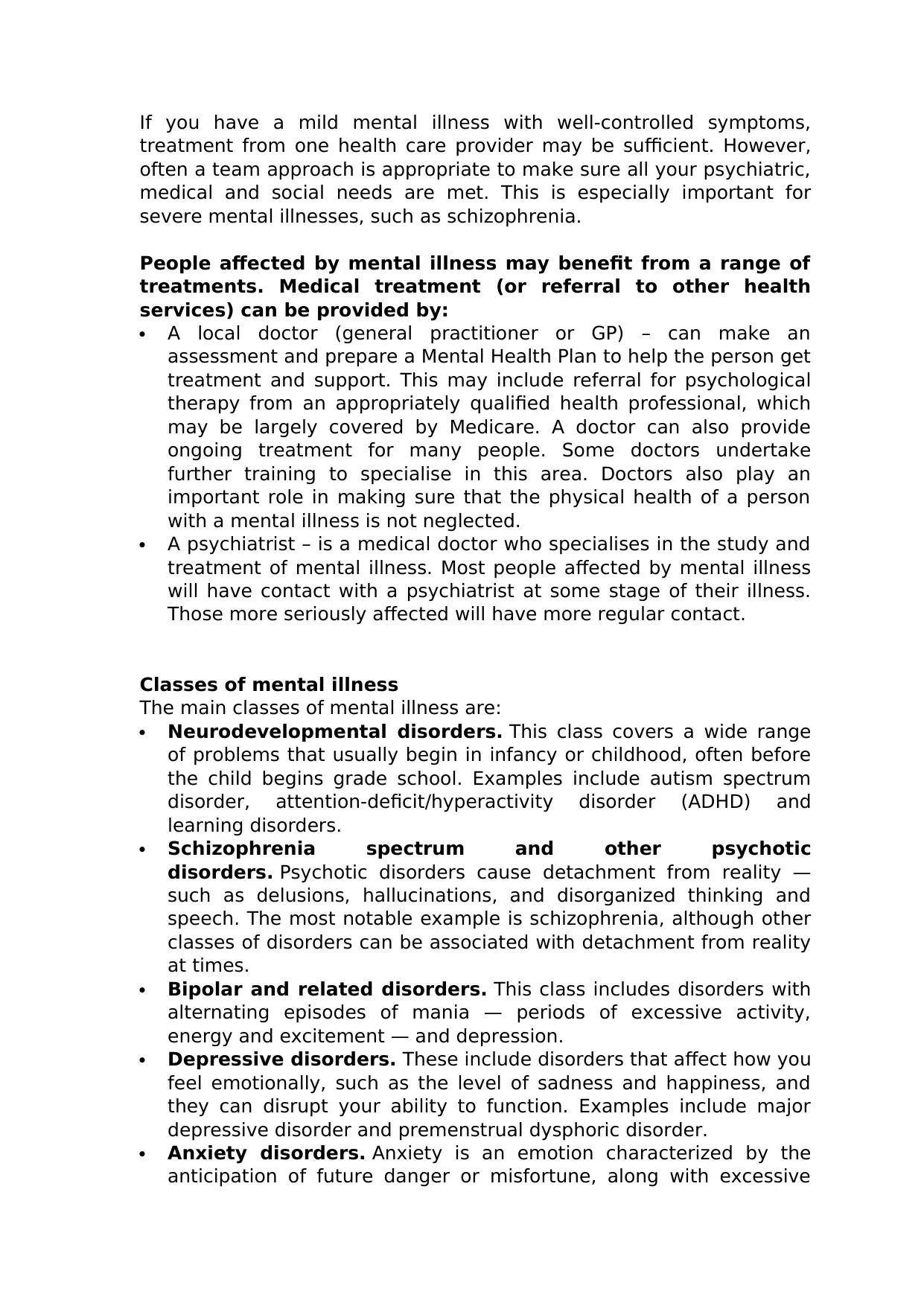
If you have a mild mental illness with well-controlled symptoms,
treatment from one health care provider may be sufficient. However,
often a team approach is appropriate to make sure all your psychiatric,
medical and social needs are met. This is especially important for
severe mental illnesses, such as schizophrenia.
People affected by mental illness may benefit from a range of
treatments. Medical treatment (or referral to other health
services) can be provided by:
A local doctor (general practitioner or GP) – can make an
assessment and prepare a Mental Health Plan to help the person get
treatment and support. This may include referral for psychological
therapy from an appropriately qualified health professional, which
may be largely covered by Medicare. A doctor can also provide
ongoing treatment for many people. Some doctors undertake
further training to specialise in this area. Doctors also play an
important role in making sure that the physical health of a person
with a mental illness is not neglected.
A psychiatrist – is a medical doctor who specialises in the study and
treatment of mental illness. Most people affected by mental illness
will have contact with a psychiatrist at some stage of their illness.
Those more seriously affected will have more regular contact.
Classes of mental illness
The main classes of mental illness are:
Neurodevelopmental disorders. This class covers a wide range
of problems that usually begin in infancy or childhood, often before
the child begins grade school. Examples include autism spectrum
disorder, attention-deficit/hyperactivity disorder (ADHD) and
learning disorders.
Schizophrenia spectrum and other psychotic
disorders. Psychotic disorders cause detachment from reality —
such as delusions, hallucinations, and disorganized thinking and
speech. The most notable example is schizophrenia, although other
classes of disorders can be associated with detachment from reality
at times.
Bipolar and related disorders. This class includes disorders with
alternating episodes of mania — periods of excessive activity,
energy and excitement — and depression.
Depressive disorders. These include disorders that affect how you
feel emotionally, such as the level of sadness and happiness, and
they can disrupt your ability to function. Examples include major
depressive disorder and premenstrual dysphoric disorder.
Anxiety disorders. Anxiety is an emotion characterized by the
anticipation of future danger or misfortune, along with excessive
treatment from one health care provider may be sufficient. However,
often a team approach is appropriate to make sure all your psychiatric,
medical and social needs are met. This is especially important for
severe mental illnesses, such as schizophrenia.
People affected by mental illness may benefit from a range of
treatments. Medical treatment (or referral to other health
services) can be provided by:
A local doctor (general practitioner or GP) – can make an
assessment and prepare a Mental Health Plan to help the person get
treatment and support. This may include referral for psychological
therapy from an appropriately qualified health professional, which
may be largely covered by Medicare. A doctor can also provide
ongoing treatment for many people. Some doctors undertake
further training to specialise in this area. Doctors also play an
important role in making sure that the physical health of a person
with a mental illness is not neglected.
A psychiatrist – is a medical doctor who specialises in the study and
treatment of mental illness. Most people affected by mental illness
will have contact with a psychiatrist at some stage of their illness.
Those more seriously affected will have more regular contact.
Classes of mental illness
The main classes of mental illness are:
Neurodevelopmental disorders. This class covers a wide range
of problems that usually begin in infancy or childhood, often before
the child begins grade school. Examples include autism spectrum
disorder, attention-deficit/hyperactivity disorder (ADHD) and
learning disorders.
Schizophrenia spectrum and other psychotic
disorders. Psychotic disorders cause detachment from reality —
such as delusions, hallucinations, and disorganized thinking and
speech. The most notable example is schizophrenia, although other
classes of disorders can be associated with detachment from reality
at times.
Bipolar and related disorders. This class includes disorders with
alternating episodes of mania — periods of excessive activity,
energy and excitement — and depression.
Depressive disorders. These include disorders that affect how you
feel emotionally, such as the level of sadness and happiness, and
they can disrupt your ability to function. Examples include major
depressive disorder and premenstrual dysphoric disorder.
Anxiety disorders. Anxiety is an emotion characterized by the
anticipation of future danger or misfortune, along with excessive
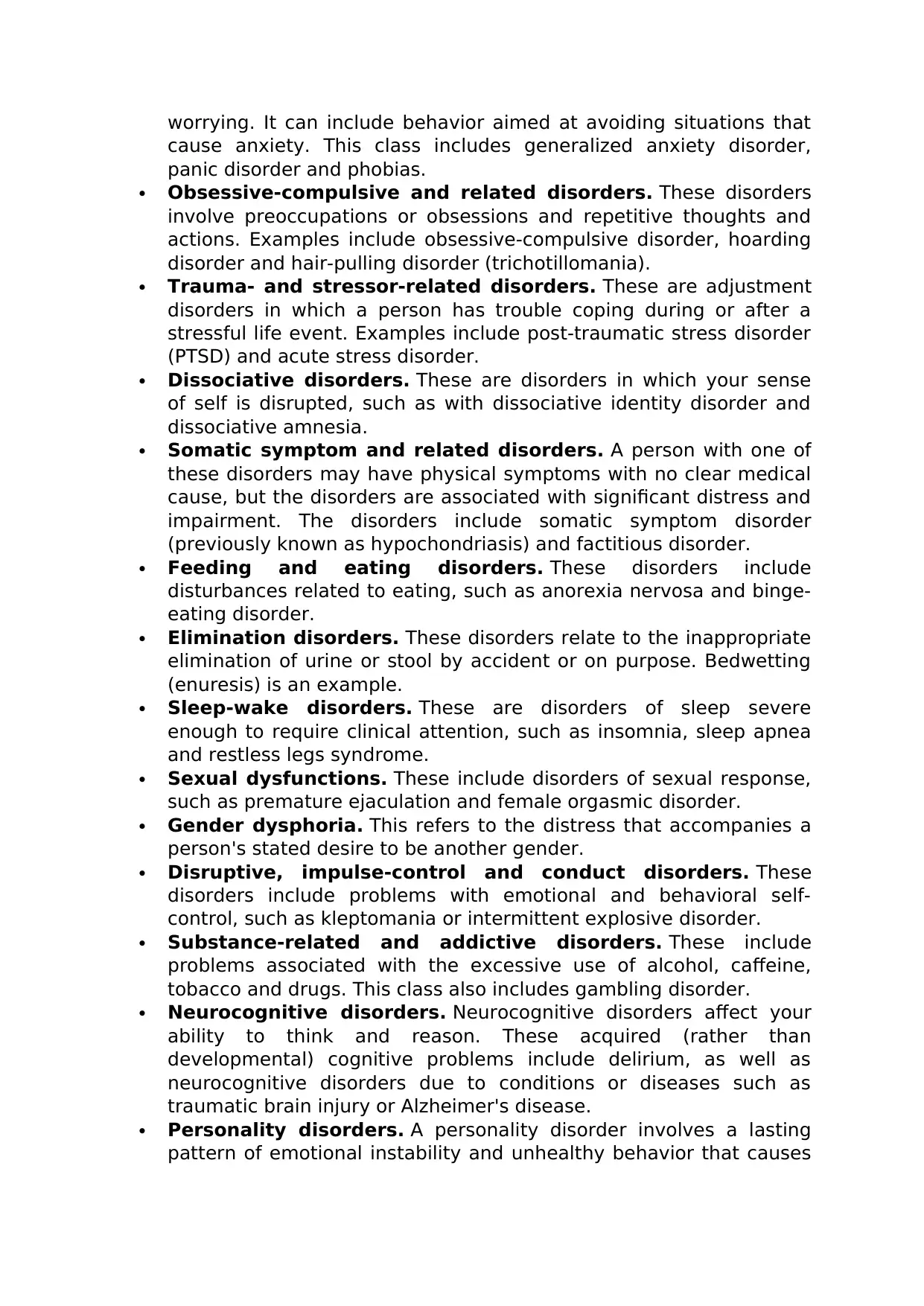
worrying. It can include behavior aimed at avoiding situations that
cause anxiety. This class includes generalized anxiety disorder,
panic disorder and phobias.
Obsessive-compulsive and related disorders. These disorders
involve preoccupations or obsessions and repetitive thoughts and
actions. Examples include obsessive-compulsive disorder, hoarding
disorder and hair-pulling disorder (trichotillomania).
Trauma- and stressor-related disorders. These are adjustment
disorders in which a person has trouble coping during or after a
stressful life event. Examples include post-traumatic stress disorder
(PTSD) and acute stress disorder.
Dissociative disorders. These are disorders in which your sense
of self is disrupted, such as with dissociative identity disorder and
dissociative amnesia.
Somatic symptom and related disorders. A person with one of
these disorders may have physical symptoms with no clear medical
cause, but the disorders are associated with significant distress and
impairment. The disorders include somatic symptom disorder
(previously known as hypochondriasis) and factitious disorder.
Feeding and eating disorders. These disorders include
disturbances related to eating, such as anorexia nervosa and binge-
eating disorder.
Elimination disorders. These disorders relate to the inappropriate
elimination of urine or stool by accident or on purpose. Bedwetting
(enuresis) is an example.
Sleep-wake disorders. These are disorders of sleep severe
enough to require clinical attention, such as insomnia, sleep apnea
and restless legs syndrome.
Sexual dysfunctions. These include disorders of sexual response,
such as premature ejaculation and female orgasmic disorder.
Gender dysphoria. This refers to the distress that accompanies a
person's stated desire to be another gender.
Disruptive, impulse-control and conduct disorders. These
disorders include problems with emotional and behavioral self-
control, such as kleptomania or intermittent explosive disorder.
Substance-related and addictive disorders. These include
problems associated with the excessive use of alcohol, caffeine,
tobacco and drugs. This class also includes gambling disorder.
Neurocognitive disorders. Neurocognitive disorders affect your
ability to think and reason. These acquired (rather than
developmental) cognitive problems include delirium, as well as
neurocognitive disorders due to conditions or diseases such as
traumatic brain injury or Alzheimer's disease.
Personality disorders. A personality disorder involves a lasting
pattern of emotional instability and unhealthy behavior that causes
cause anxiety. This class includes generalized anxiety disorder,
panic disorder and phobias.
Obsessive-compulsive and related disorders. These disorders
involve preoccupations or obsessions and repetitive thoughts and
actions. Examples include obsessive-compulsive disorder, hoarding
disorder and hair-pulling disorder (trichotillomania).
Trauma- and stressor-related disorders. These are adjustment
disorders in which a person has trouble coping during or after a
stressful life event. Examples include post-traumatic stress disorder
(PTSD) and acute stress disorder.
Dissociative disorders. These are disorders in which your sense
of self is disrupted, such as with dissociative identity disorder and
dissociative amnesia.
Somatic symptom and related disorders. A person with one of
these disorders may have physical symptoms with no clear medical
cause, but the disorders are associated with significant distress and
impairment. The disorders include somatic symptom disorder
(previously known as hypochondriasis) and factitious disorder.
Feeding and eating disorders. These disorders include
disturbances related to eating, such as anorexia nervosa and binge-
eating disorder.
Elimination disorders. These disorders relate to the inappropriate
elimination of urine or stool by accident or on purpose. Bedwetting
(enuresis) is an example.
Sleep-wake disorders. These are disorders of sleep severe
enough to require clinical attention, such as insomnia, sleep apnea
and restless legs syndrome.
Sexual dysfunctions. These include disorders of sexual response,
such as premature ejaculation and female orgasmic disorder.
Gender dysphoria. This refers to the distress that accompanies a
person's stated desire to be another gender.
Disruptive, impulse-control and conduct disorders. These
disorders include problems with emotional and behavioral self-
control, such as kleptomania or intermittent explosive disorder.
Substance-related and addictive disorders. These include
problems associated with the excessive use of alcohol, caffeine,
tobacco and drugs. This class also includes gambling disorder.
Neurocognitive disorders. Neurocognitive disorders affect your
ability to think and reason. These acquired (rather than
developmental) cognitive problems include delirium, as well as
neurocognitive disorders due to conditions or diseases such as
traumatic brain injury or Alzheimer's disease.
Personality disorders. A personality disorder involves a lasting
pattern of emotional instability and unhealthy behavior that causes
⊘ This is a preview!⊘
Do you want full access?
Subscribe today to unlock all pages.

Trusted by 1+ million students worldwide
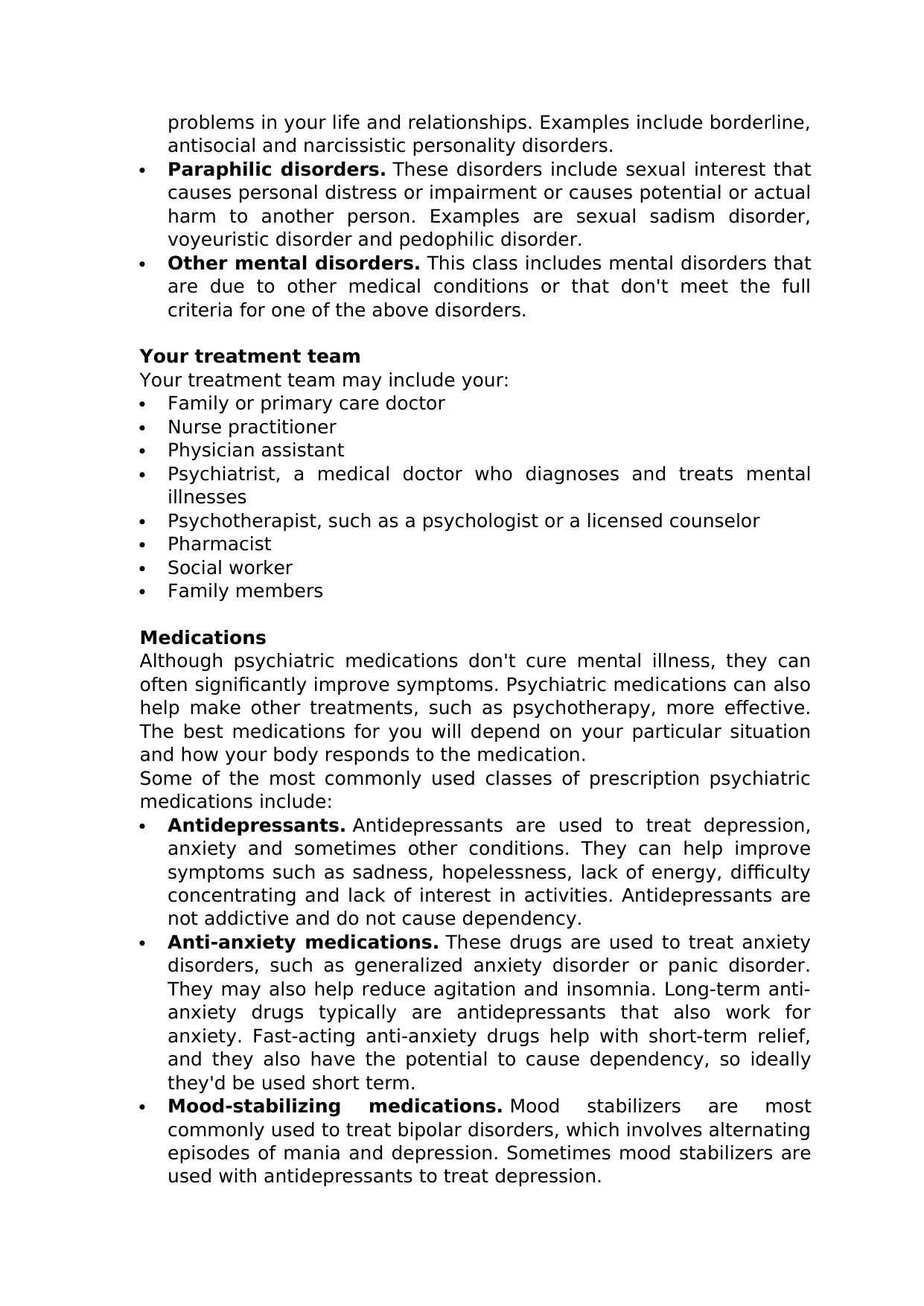
problems in your life and relationships. Examples include borderline,
antisocial and narcissistic personality disorders.
Paraphilic disorders. These disorders include sexual interest that
causes personal distress or impairment or causes potential or actual
harm to another person. Examples are sexual sadism disorder,
voyeuristic disorder and pedophilic disorder.
Other mental disorders. This class includes mental disorders that
are due to other medical conditions or that don't meet the full
criteria for one of the above disorders.
Your treatment team
Your treatment team may include your:
Family or primary care doctor
Nurse practitioner
Physician assistant
Psychiatrist, a medical doctor who diagnoses and treats mental
illnesses
Psychotherapist, such as a psychologist or a licensed counselor
Pharmacist
Social worker
Family members
Medications
Although psychiatric medications don't cure mental illness, they can
often significantly improve symptoms. Psychiatric medications can also
help make other treatments, such as psychotherapy, more effective.
The best medications for you will depend on your particular situation
and how your body responds to the medication.
Some of the most commonly used classes of prescription psychiatric
medications include:
Antidepressants. Antidepressants are used to treat depression,
anxiety and sometimes other conditions. They can help improve
symptoms such as sadness, hopelessness, lack of energy, difficulty
concentrating and lack of interest in activities. Antidepressants are
not addictive and do not cause dependency.
Anti-anxiety medications. These drugs are used to treat anxiety
disorders, such as generalized anxiety disorder or panic disorder.
They may also help reduce agitation and insomnia. Long-term anti-
anxiety drugs typically are antidepressants that also work for
anxiety. Fast-acting anti-anxiety drugs help with short-term relief,
and they also have the potential to cause dependency, so ideally
they'd be used short term.
Mood-stabilizing medications. Mood stabilizers are most
commonly used to treat bipolar disorders, which involves alternating
episodes of mania and depression. Sometimes mood stabilizers are
used with antidepressants to treat depression.
antisocial and narcissistic personality disorders.
Paraphilic disorders. These disorders include sexual interest that
causes personal distress or impairment or causes potential or actual
harm to another person. Examples are sexual sadism disorder,
voyeuristic disorder and pedophilic disorder.
Other mental disorders. This class includes mental disorders that
are due to other medical conditions or that don't meet the full
criteria for one of the above disorders.
Your treatment team
Your treatment team may include your:
Family or primary care doctor
Nurse practitioner
Physician assistant
Psychiatrist, a medical doctor who diagnoses and treats mental
illnesses
Psychotherapist, such as a psychologist or a licensed counselor
Pharmacist
Social worker
Family members
Medications
Although psychiatric medications don't cure mental illness, they can
often significantly improve symptoms. Psychiatric medications can also
help make other treatments, such as psychotherapy, more effective.
The best medications for you will depend on your particular situation
and how your body responds to the medication.
Some of the most commonly used classes of prescription psychiatric
medications include:
Antidepressants. Antidepressants are used to treat depression,
anxiety and sometimes other conditions. They can help improve
symptoms such as sadness, hopelessness, lack of energy, difficulty
concentrating and lack of interest in activities. Antidepressants are
not addictive and do not cause dependency.
Anti-anxiety medications. These drugs are used to treat anxiety
disorders, such as generalized anxiety disorder or panic disorder.
They may also help reduce agitation and insomnia. Long-term anti-
anxiety drugs typically are antidepressants that also work for
anxiety. Fast-acting anti-anxiety drugs help with short-term relief,
and they also have the potential to cause dependency, so ideally
they'd be used short term.
Mood-stabilizing medications. Mood stabilizers are most
commonly used to treat bipolar disorders, which involves alternating
episodes of mania and depression. Sometimes mood stabilizers are
used with antidepressants to treat depression.
Paraphrase This Document
Need a fresh take? Get an instant paraphrase of this document with our AI Paraphraser
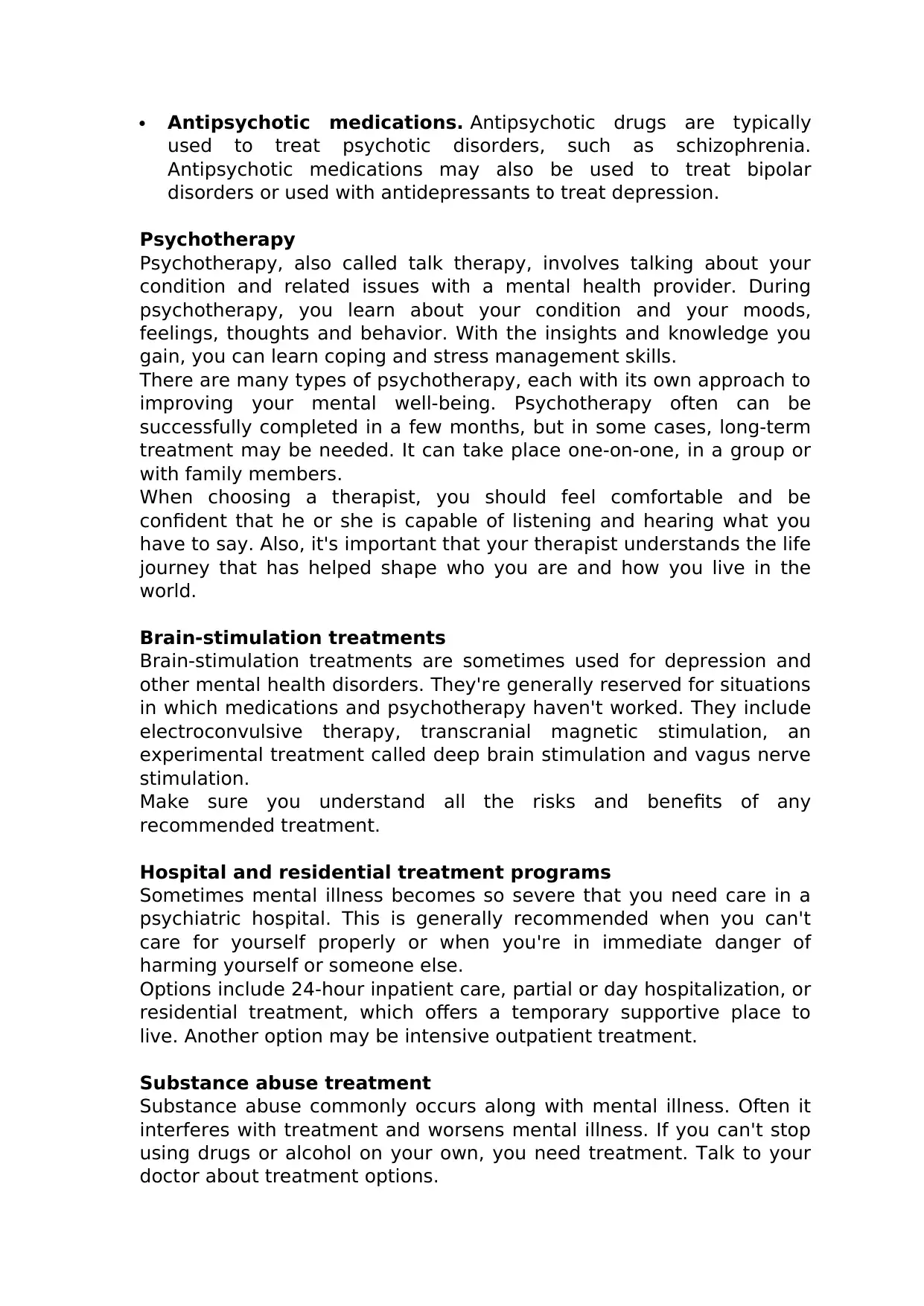
Antipsychotic medications. Antipsychotic drugs are typically
used to treat psychotic disorders, such as schizophrenia.
Antipsychotic medications may also be used to treat bipolar
disorders or used with antidepressants to treat depression.
Psychotherapy
Psychotherapy, also called talk therapy, involves talking about your
condition and related issues with a mental health provider. During
psychotherapy, you learn about your condition and your moods,
feelings, thoughts and behavior. With the insights and knowledge you
gain, you can learn coping and stress management skills.
There are many types of psychotherapy, each with its own approach to
improving your mental well-being. Psychotherapy often can be
successfully completed in a few months, but in some cases, long-term
treatment may be needed. It can take place one-on-one, in a group or
with family members.
When choosing a therapist, you should feel comfortable and be
confident that he or she is capable of listening and hearing what you
have to say. Also, it's important that your therapist understands the life
journey that has helped shape who you are and how you live in the
world.
Brain-stimulation treatments
Brain-stimulation treatments are sometimes used for depression and
other mental health disorders. They're generally reserved for situations
in which medications and psychotherapy haven't worked. They include
electroconvulsive therapy, transcranial magnetic stimulation, an
experimental treatment called deep brain stimulation and vagus nerve
stimulation.
Make sure you understand all the risks and benefits of any
recommended treatment.
Hospital and residential treatment programs
Sometimes mental illness becomes so severe that you need care in a
psychiatric hospital. This is generally recommended when you can't
care for yourself properly or when you're in immediate danger of
harming yourself or someone else.
Options include 24-hour inpatient care, partial or day hospitalization, or
residential treatment, which offers a temporary supportive place to
live. Another option may be intensive outpatient treatment.
Substance abuse treatment
Substance abuse commonly occurs along with mental illness. Often it
interferes with treatment and worsens mental illness. If you can't stop
using drugs or alcohol on your own, you need treatment. Talk to your
doctor about treatment options.
used to treat psychotic disorders, such as schizophrenia.
Antipsychotic medications may also be used to treat bipolar
disorders or used with antidepressants to treat depression.
Psychotherapy
Psychotherapy, also called talk therapy, involves talking about your
condition and related issues with a mental health provider. During
psychotherapy, you learn about your condition and your moods,
feelings, thoughts and behavior. With the insights and knowledge you
gain, you can learn coping and stress management skills.
There are many types of psychotherapy, each with its own approach to
improving your mental well-being. Psychotherapy often can be
successfully completed in a few months, but in some cases, long-term
treatment may be needed. It can take place one-on-one, in a group or
with family members.
When choosing a therapist, you should feel comfortable and be
confident that he or she is capable of listening and hearing what you
have to say. Also, it's important that your therapist understands the life
journey that has helped shape who you are and how you live in the
world.
Brain-stimulation treatments
Brain-stimulation treatments are sometimes used for depression and
other mental health disorders. They're generally reserved for situations
in which medications and psychotherapy haven't worked. They include
electroconvulsive therapy, transcranial magnetic stimulation, an
experimental treatment called deep brain stimulation and vagus nerve
stimulation.
Make sure you understand all the risks and benefits of any
recommended treatment.
Hospital and residential treatment programs
Sometimes mental illness becomes so severe that you need care in a
psychiatric hospital. This is generally recommended when you can't
care for yourself properly or when you're in immediate danger of
harming yourself or someone else.
Options include 24-hour inpatient care, partial or day hospitalization, or
residential treatment, which offers a temporary supportive place to
live. Another option may be intensive outpatient treatment.
Substance abuse treatment
Substance abuse commonly occurs along with mental illness. Often it
interferes with treatment and worsens mental illness. If you can't stop
using drugs or alcohol on your own, you need treatment. Talk to your
doctor about treatment options.
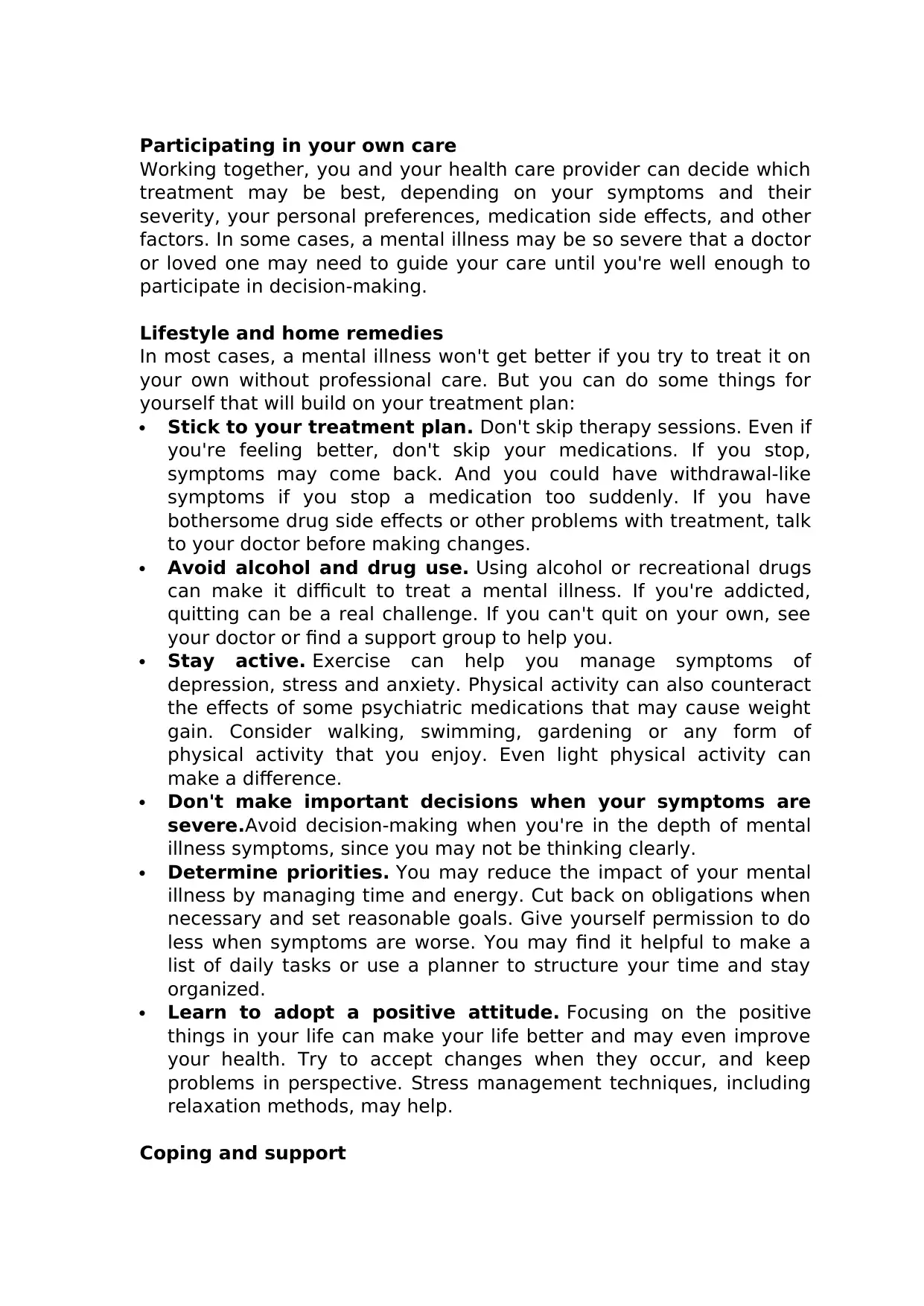
Participating in your own care
Working together, you and your health care provider can decide which
treatment may be best, depending on your symptoms and their
severity, your personal preferences, medication side effects, and other
factors. In some cases, a mental illness may be so severe that a doctor
or loved one may need to guide your care until you're well enough to
participate in decision-making.
Lifestyle and home remedies
In most cases, a mental illness won't get better if you try to treat it on
your own without professional care. But you can do some things for
yourself that will build on your treatment plan:
Stick to your treatment plan. Don't skip therapy sessions. Even if
you're feeling better, don't skip your medications. If you stop,
symptoms may come back. And you could have withdrawal-like
symptoms if you stop a medication too suddenly. If you have
bothersome drug side effects or other problems with treatment, talk
to your doctor before making changes.
Avoid alcohol and drug use. Using alcohol or recreational drugs
can make it difficult to treat a mental illness. If you're addicted,
quitting can be a real challenge. If you can't quit on your own, see
your doctor or find a support group to help you.
Stay active. Exercise can help you manage symptoms of
depression, stress and anxiety. Physical activity can also counteract
the effects of some psychiatric medications that may cause weight
gain. Consider walking, swimming, gardening or any form of
physical activity that you enjoy. Even light physical activity can
make a difference.
Don't make important decisions when your symptoms are
severe.Avoid decision-making when you're in the depth of mental
illness symptoms, since you may not be thinking clearly.
Determine priorities. You may reduce the impact of your mental
illness by managing time and energy. Cut back on obligations when
necessary and set reasonable goals. Give yourself permission to do
less when symptoms are worse. You may find it helpful to make a
list of daily tasks or use a planner to structure your time and stay
organized.
Learn to adopt a positive attitude. Focusing on the positive
things in your life can make your life better and may even improve
your health. Try to accept changes when they occur, and keep
problems in perspective. Stress management techniques, including
relaxation methods, may help.
Coping and support
Working together, you and your health care provider can decide which
treatment may be best, depending on your symptoms and their
severity, your personal preferences, medication side effects, and other
factors. In some cases, a mental illness may be so severe that a doctor
or loved one may need to guide your care until you're well enough to
participate in decision-making.
Lifestyle and home remedies
In most cases, a mental illness won't get better if you try to treat it on
your own without professional care. But you can do some things for
yourself that will build on your treatment plan:
Stick to your treatment plan. Don't skip therapy sessions. Even if
you're feeling better, don't skip your medications. If you stop,
symptoms may come back. And you could have withdrawal-like
symptoms if you stop a medication too suddenly. If you have
bothersome drug side effects or other problems with treatment, talk
to your doctor before making changes.
Avoid alcohol and drug use. Using alcohol or recreational drugs
can make it difficult to treat a mental illness. If you're addicted,
quitting can be a real challenge. If you can't quit on your own, see
your doctor or find a support group to help you.
Stay active. Exercise can help you manage symptoms of
depression, stress and anxiety. Physical activity can also counteract
the effects of some psychiatric medications that may cause weight
gain. Consider walking, swimming, gardening or any form of
physical activity that you enjoy. Even light physical activity can
make a difference.
Don't make important decisions when your symptoms are
severe.Avoid decision-making when you're in the depth of mental
illness symptoms, since you may not be thinking clearly.
Determine priorities. You may reduce the impact of your mental
illness by managing time and energy. Cut back on obligations when
necessary and set reasonable goals. Give yourself permission to do
less when symptoms are worse. You may find it helpful to make a
list of daily tasks or use a planner to structure your time and stay
organized.
Learn to adopt a positive attitude. Focusing on the positive
things in your life can make your life better and may even improve
your health. Try to accept changes when they occur, and keep
problems in perspective. Stress management techniques, including
relaxation methods, may help.
Coping and support
⊘ This is a preview!⊘
Do you want full access?
Subscribe today to unlock all pages.

Trusted by 1+ million students worldwide
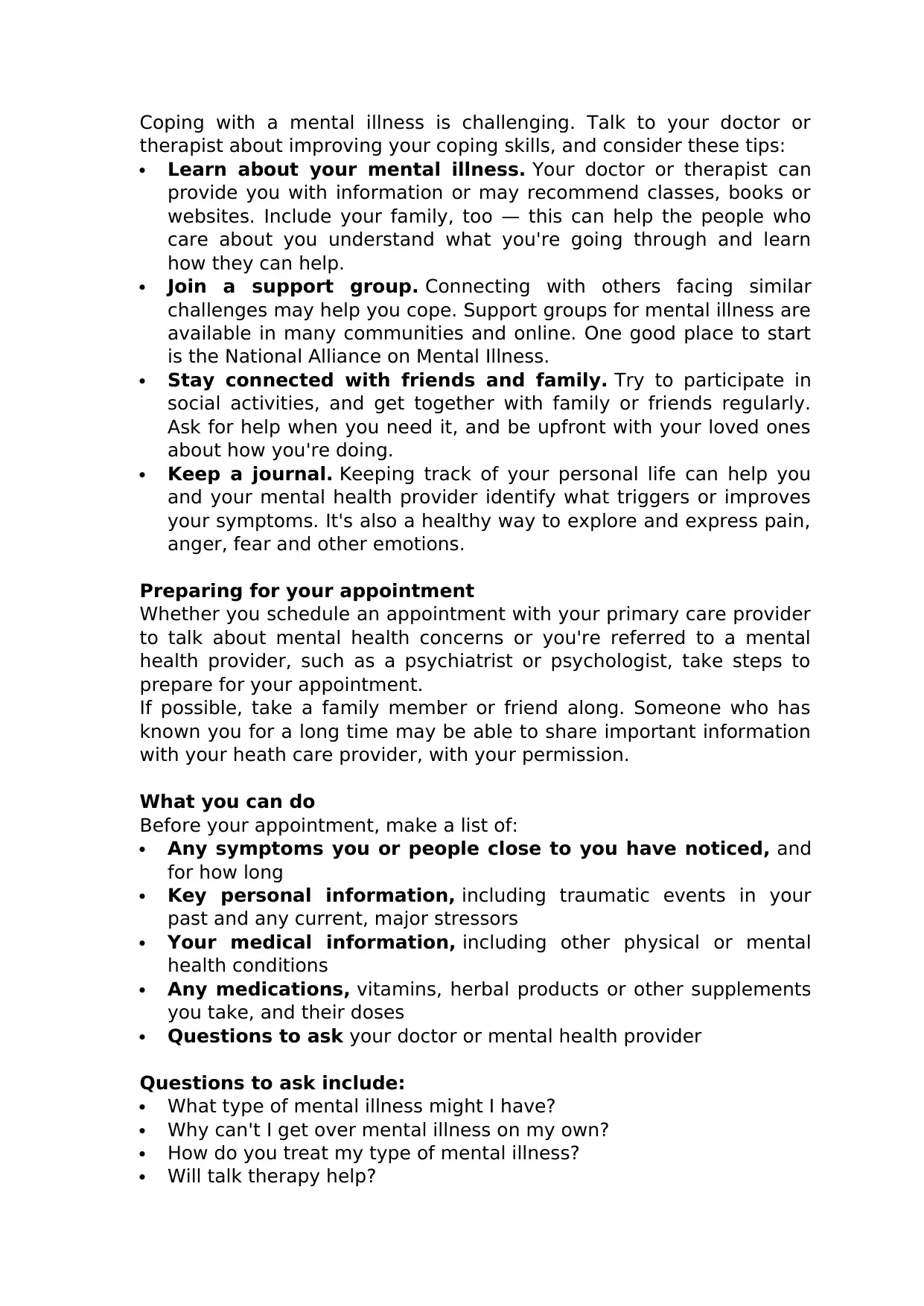
Coping with a mental illness is challenging. Talk to your doctor or
therapist about improving your coping skills, and consider these tips:
Learn about your mental illness. Your doctor or therapist can
provide you with information or may recommend classes, books or
websites. Include your family, too — this can help the people who
care about you understand what you're going through and learn
how they can help.
Join a support group. Connecting with others facing similar
challenges may help you cope. Support groups for mental illness are
available in many communities and online. One good place to start
is the National Alliance on Mental Illness.
Stay connected with friends and family. Try to participate in
social activities, and get together with family or friends regularly.
Ask for help when you need it, and be upfront with your loved ones
about how you're doing.
Keep a journal. Keeping track of your personal life can help you
and your mental health provider identify what triggers or improves
your symptoms. It's also a healthy way to explore and express pain,
anger, fear and other emotions.
Preparing for your appointment
Whether you schedule an appointment with your primary care provider
to talk about mental health concerns or you're referred to a mental
health provider, such as a psychiatrist or psychologist, take steps to
prepare for your appointment.
If possible, take a family member or friend along. Someone who has
known you for a long time may be able to share important information
with your heath care provider, with your permission.
What you can do
Before your appointment, make a list of:
Any symptoms you or people close to you have noticed, and
for how long
Key personal information, including traumatic events in your
past and any current, major stressors
Your medical information, including other physical or mental
health conditions
Any medications, vitamins, herbal products or other supplements
you take, and their doses
Questions to ask your doctor or mental health provider
Questions to ask include:
What type of mental illness might I have?
Why can't I get over mental illness on my own?
How do you treat my type of mental illness?
Will talk therapy help?
therapist about improving your coping skills, and consider these tips:
Learn about your mental illness. Your doctor or therapist can
provide you with information or may recommend classes, books or
websites. Include your family, too — this can help the people who
care about you understand what you're going through and learn
how they can help.
Join a support group. Connecting with others facing similar
challenges may help you cope. Support groups for mental illness are
available in many communities and online. One good place to start
is the National Alliance on Mental Illness.
Stay connected with friends and family. Try to participate in
social activities, and get together with family or friends regularly.
Ask for help when you need it, and be upfront with your loved ones
about how you're doing.
Keep a journal. Keeping track of your personal life can help you
and your mental health provider identify what triggers or improves
your symptoms. It's also a healthy way to explore and express pain,
anger, fear and other emotions.
Preparing for your appointment
Whether you schedule an appointment with your primary care provider
to talk about mental health concerns or you're referred to a mental
health provider, such as a psychiatrist or psychologist, take steps to
prepare for your appointment.
If possible, take a family member or friend along. Someone who has
known you for a long time may be able to share important information
with your heath care provider, with your permission.
What you can do
Before your appointment, make a list of:
Any symptoms you or people close to you have noticed, and
for how long
Key personal information, including traumatic events in your
past and any current, major stressors
Your medical information, including other physical or mental
health conditions
Any medications, vitamins, herbal products or other supplements
you take, and their doses
Questions to ask your doctor or mental health provider
Questions to ask include:
What type of mental illness might I have?
Why can't I get over mental illness on my own?
How do you treat my type of mental illness?
Will talk therapy help?
Paraphrase This Document
Need a fresh take? Get an instant paraphrase of this document with our AI Paraphraser
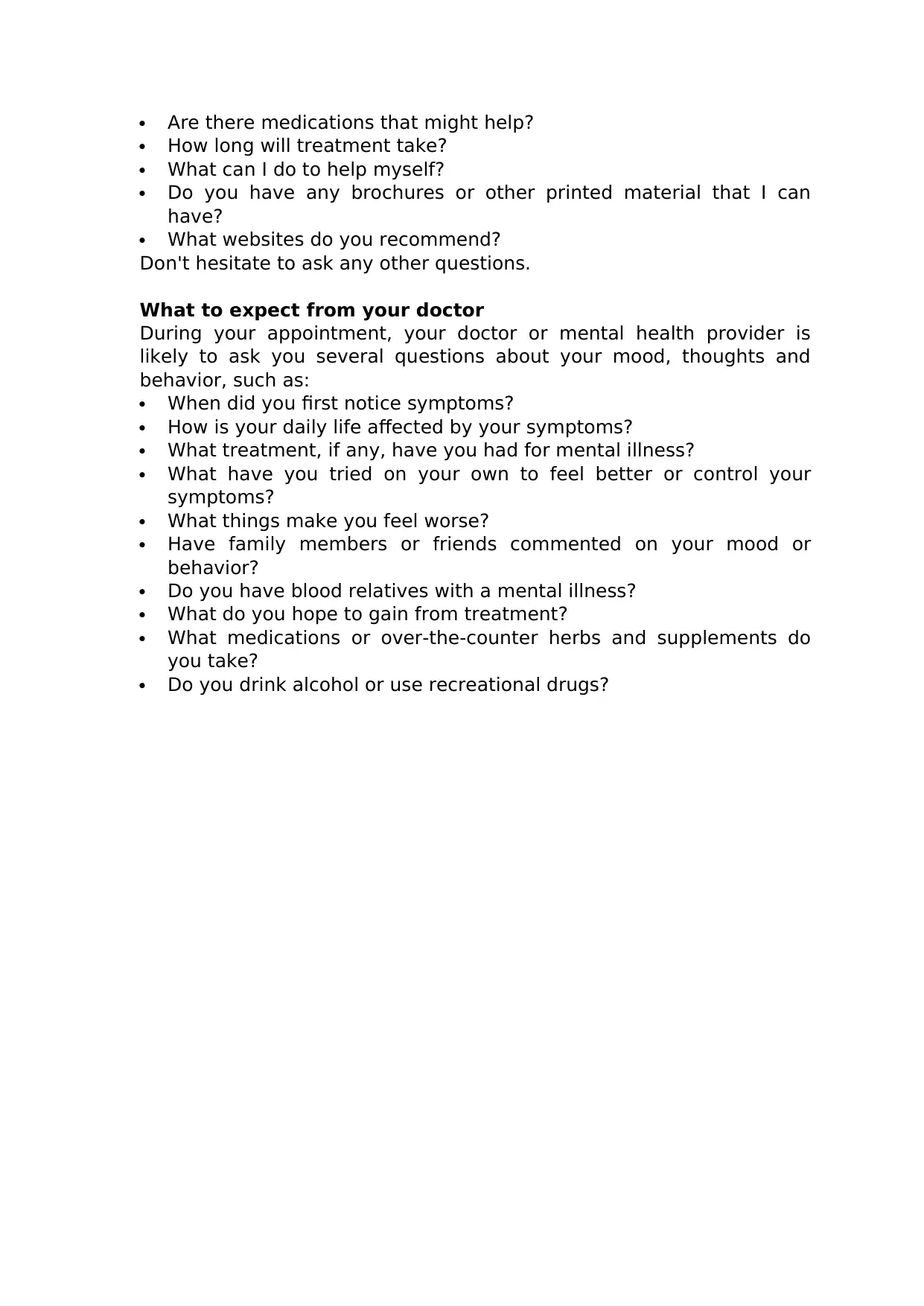
Are there medications that might help?
How long will treatment take?
What can I do to help myself?
Do you have any brochures or other printed material that I can
have?
What websites do you recommend?
Don't hesitate to ask any other questions.
What to expect from your doctor
During your appointment, your doctor or mental health provider is
likely to ask you several questions about your mood, thoughts and
behavior, such as:
When did you first notice symptoms?
How is your daily life affected by your symptoms?
What treatment, if any, have you had for mental illness?
What have you tried on your own to feel better or control your
symptoms?
What things make you feel worse?
Have family members or friends commented on your mood or
behavior?
Do you have blood relatives with a mental illness?
What do you hope to gain from treatment?
What medications or over-the-counter herbs and supplements do
you take?
Do you drink alcohol or use recreational drugs?
How long will treatment take?
What can I do to help myself?
Do you have any brochures or other printed material that I can
have?
What websites do you recommend?
Don't hesitate to ask any other questions.
What to expect from your doctor
During your appointment, your doctor or mental health provider is
likely to ask you several questions about your mood, thoughts and
behavior, such as:
When did you first notice symptoms?
How is your daily life affected by your symptoms?
What treatment, if any, have you had for mental illness?
What have you tried on your own to feel better or control your
symptoms?
What things make you feel worse?
Have family members or friends commented on your mood or
behavior?
Do you have blood relatives with a mental illness?
What do you hope to gain from treatment?
What medications or over-the-counter herbs and supplements do
you take?
Do you drink alcohol or use recreational drugs?
1 out of 11
Related Documents
Your All-in-One AI-Powered Toolkit for Academic Success.
+13062052269
info@desklib.com
Available 24*7 on WhatsApp / Email
![[object Object]](/_next/static/media/star-bottom.7253800d.svg)
Unlock your academic potential
Copyright © 2020–2026 A2Z Services. All Rights Reserved. Developed and managed by ZUCOL.





